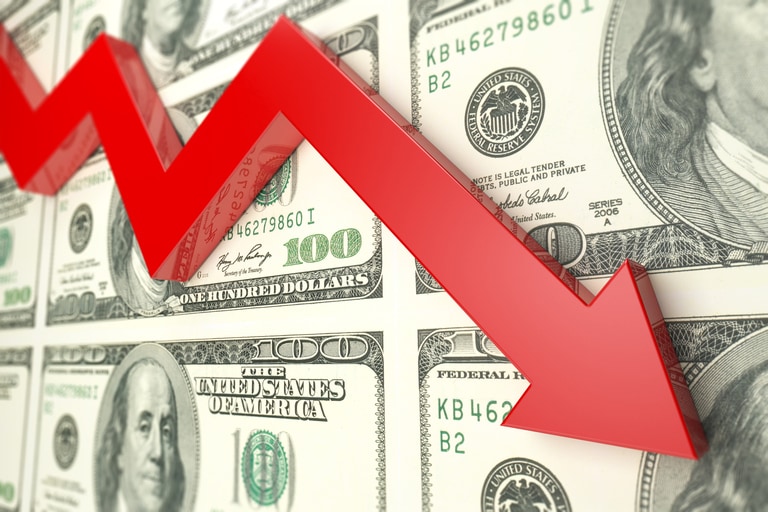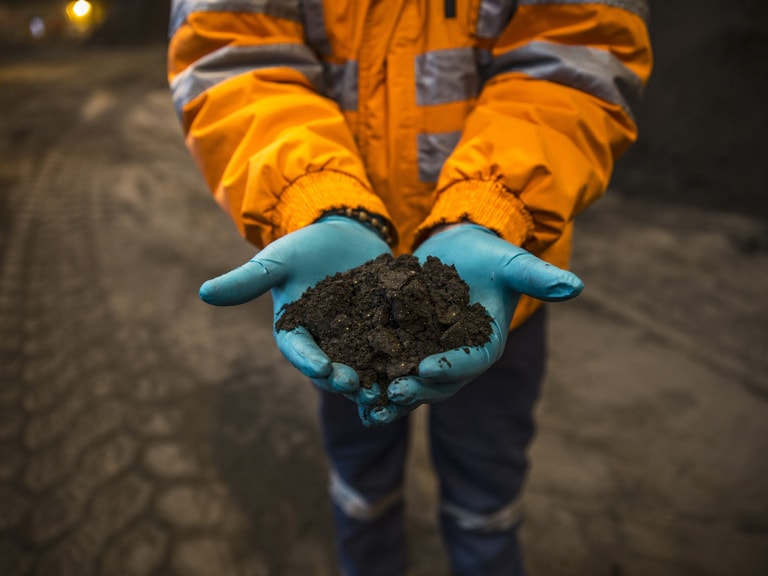Read our pick of the top stories to look out for this week (1-5 March), and view our key company earnings schedule.
Michael looks back at this week’s stock market activity in the context of the sharp rise in bond yields, as well as looking ahead to next week’s UK Budget, and the latest US employment report for February. He looks at the key technical levels on GBP/USD, EUR/GBP and EUR/USD, as well as looking at the various support and resistance levels on FTSE 100, DAX, Nasdaq and S&P 500.
Novavax Q4 results
Monday: Up until the end of January, Novavax had been flying below the radar when it came to coronavirus vaccine candidates, even though it was well known that the US pharmaceutical company was undertaking UK trials. Having never been able to produce a successful vaccine in its time as a listed company, expectations of success were low.
But after reports of the vaccine's efficacy showing 89.3% in phase 3 trials in the UK, with good protection of 86% for both UK and South African variants, Novavax’s share price surged sharply to new record peaks during early February. While virus cases and deaths have started to fall, the fact that Novavax’s new vaccine candidate has solid protection against these new variants suggests that future demand is likely to be strong.
The UK government ordered 60m doses back in August, with these expected to be manufactured on Teesside. Full-year revenues are expected to come in somewhere close to $490m, a big improvement on the levels a year ago, though profits may take a little longer. Expectations for 2021 are even more ambitious with revenues expected to explode up to $3.5bn. With a lot of upfront costs in terms of the development of production capacity, losses are expected to come in at $1.72c a share, but profits could well come in 2021 as revenues move higher.
Zoom Q4 results
Monday: One of the big winners of 2020, Zoom’s share price has risen exponentially as a result of the pandemic. The company only came to market at the end of 2019, at $36 a share with a valuation of $9bn. The biggest concern at the time was the technology was easily replicable, but unlike a lot of its IPO peers at the time Zoom is profitable, which automatically set it apart as a company worth watching. There was also the fact that a lot of its competition in the form of Webex, LogMeIn and Skype were still pretty mediocre.
Revenues have boomed this year, with a Q3 rise of 367% to $777.2m, topping the $694m consensus estimate, and up from the $663.5m of Q2. For comparison, Q1 revenues came in at $328m. This rise in Q3 revenues are thanks to success in the less well-established markets of Europe, the Middle East and Africa, which grew 629%.
The Zoom share price has come off the boil in the last few months, from peaks of almost $588 back in October, as the prospect of an economic reopening and a successful vaccine rollout suggests that business might start to slow.
There is no doubt that Zoom has done very well, however there have been signs of growing pains in terms of its infrastructure, which may well need some investment to improve its resilience, after some outages back in August last year. Questions need to be asked as to whether the company is worth over $120bn. For a start, Zoom’s success has prompted its competitors to up their game, so the fledgling company could find it harder to stand still as time goes by. This could put the sustainability of Zoom’s current valuation under slightly more scrutiny. Q4 profits are expected to come in at $0.78c a share.
Target Q4 results
Tuesday: Target has managed to avoid the perils of a large store footprint, while adding a strong ecommerce side to its business model. Turnover of the US retailer’s kerbside pick-up, or click and collect service, increased 500%. In Q3 total revenue jumped by 21% to $22.63bn, well ahead of forecasts. Digital sales surged by 155%, while same-store sales increased by 9.9%.
The strong performance was down to Target stores remaining open during the lockdown. In Q3, electrical items and household goods sales rose 50% and 20% respectively. In the same quarter, the company said it had won $6bn in market share, however rather curiously management declined to offer an outlook for Q4. That said market expectations are for Q4 profits to come in slightly below Q3’s $2.79c a share, at $2.44c. This makes sense given the slowdown in US retail sales towards the end of last year, which might also suggest lower revenues as well.
Taylor Wimpey full-year results
Tuesday: When Taylor Wimpey reported its Q4 numbers in January, the initial reaction was a little underwhelming. Total completions were down 39% to 9,609 in 2020, primarily due to the lockdowns at the beginning of its financial year. This seems rather a big fall when compared to its peers, and perhaps explains the Taylor-Wimpey share price reaction.
On the plus side average selling prices rose 6% to £323,000, while the total order book rose by over £500m to £2.68bn, which represents 10,685 homes. As for the outlook, management were fairly bullish back in January with expectations that margins could well improve to 21% to 22%, and 50% of the order book forward sold. We can also expect to see a recommencement of the dividend in 2021, starting with 2020’s final dividend, though it was notable that they didn’t completely commit to it. This week’s full-year numbers could change that, along with a review of the 2021 special dividend for payment in 2022.
Global services PMIs (February)
Wednesday: China and the US aside, the services sector continues to bear the brunt of the global pandemic. Even where there is outperformance, jobs recovery in these sectors has struggled to match up to the headline numbers. The slow rollout of the vaccine programme in France and Germany is hampering economic activity there, with last month’s flash PMIs pointing to a February slowdown from January’s levels. France slipped to 43.6, while Germany slipped back to 45.9, however economic activity in the UK showed a sharp rebound to 49.7, from 39.5 in January.
While the UK government is outlining a roadmap out of lockdown, albeit on a very slow basis, there is little talk of that in Europe. If these numbers are confirmed it will also reaffirm the continued divergence between the services sector and manufacturing, which continues to show fairly decent economic outperformance despite restrictions.
The latest Spain and Italy services numbers are also expected to remain subdued with services activity to remain sub-50. With restaurants and bars in France set to remain closed until Easter, and Germany still in various states of tightened restrictions, it is hard to make a case for any type of decent recovery any time soon, which means February is likely to see the sixth conservative month of contraction.
Despite the positive vaccine news lifting the mood from a markets point of view, the various delays in the vaccine rollout mean that it is clear that there will be no significant uptick in economic activity until restrictions start to be eased, perhaps sometime in the late spring.
Persimmon full-year results
Wednesday: Having paid a second interim dividend of 70p in December, Persimmon have been able to absorb a lot of pandemic bad news. In January, the housebuilders followed this with another decent set of numbers for its most recent quarter, with new completions only running slightly below the levels of last year at 13,575.
Average selling prices were slightly higher at £230,500, however that wasn’t enough to prevent a slight drop in revenues to £3.33bn. Forward sales on the other hand are running well ahead of last year at £1.69bn, helped largely by buyers looking to get in ahead of the expiry of the stamp duty holiday at the end of March. Profits are also likely to be impacted by the setting aside of £75m in its 2020 results to address any outstanding cladding issues, and complete any safety work that needs to be done on 26 buildings that it has built over the past few years.
Prudential full-year results
Wednesday: Asset managers and reinsurers haven’t had the best of times of it in recent months, with the sharp falls and subsequent rebounds in financial markets. Last May, Prudential said that Asia sales had seen a 24% fall year-on-year due to the problems in China and Hong Kong. Outside of the Asia region the picture was more positive in Q1, as the US market outperformed with a 25% rise in sales. However this is likely to be offset by a poor performance in Q2 given the lockdowns there.
In August management announced its intention to IPO its stake in US operation, Jackson National. The company had already laid the groundwork for such a move in July when it completed a $500m equity investment by Athene Life into its US business, as it looked to bolster its capital position. Having already divested its UK business, the move in August appears to be part of a new strategy to focus its energies on its Africa and Asia markets, where it is believed that there is likely to be greater growth potential.
In H1, adjusted operating profit for the region showed a rise of 14%, with the US operations down by 19%. The Jackson separation looks to be on track for Q2 of 2021, by way of a demerger, while in January Prudential announced the possibility of a capital raise of around $2.5bn to $3bn to help take advantage of future growth prospects in Asia.
UK Budget
Wednesday: It’s set to be a big week for Chancellor of the Exchequer Rishi Sunak as he outlines the outlook for the UK economy over the next few months. He is under pressure from all sides to not raise taxes and cut spending too soon, even as optimism rises over an economic reopening. An extension of furlough, is widely expected, along with the continued suspension of business rates, and the temporary reductions to VAT. There is a fear he could raise corporation tax, from its current low level of 19%, or at least set out a timeline to do so.
Read Michael's full Budget preview
US Beige Book
Wednesday: The last Fed Beige Book showed that a third of Fed districts experienced either flat or declining economic activity as 2020 drew to a close. A large part of that was down to declines in retail spending, which was borne out by similarly sharp declines in retail sales for the period.
A number of districts also saw drops in employment levels, however there were also signs that inflationary pressures were on the up. This is likely to continue in this week’s Beige Book given recent sharp rises in prices paid data. There’s likely to be a rebound in retail spending if the recent retail sales data is any sort of guide. With new stimulus measures on the way, the latest Beige Book is likely to see a much more optimist outlook than the one in January, especially given that vaccinations are now much more advanced than they were back at the beginning of the year.
Vroom Q4 results
Wednesday: Another recent development we’ve seen in online shopping has been the rise of web-based car retailers. Last year Vroom launched an IPO at $22 a share to great fanfare, in the belief that consumers would feel compelled to shop for a new or used car online, without actually test driving it. In the UK, Cazoo could well go down the same route with an IPO, and is spending lots of money on shirt sponsorship in the Premier League.
In Q2, Vroom posted a bigger than expected loss of $63.2m. Q3 guidance was also disappointing, with the company estimating an even bigger loss. In Q3 these losses came in at $0.29c a share which was slightly better than expected, however its guidance for Q4 was for losses to increase to between $0.35c to $0.41c a share. Q4 revenues are expected to come in between $372m and $414m. While the idea of an online car business seems compelling, one only needs to look at sector peer Carvana’s recent numbers to see that this particular market is a challenging one.
Aviva full-year results
Thursday: When the company reported back in August, new CEO Amanda Blanc indicated that the main focus of the business going forward would be on the company’s core markets of UK, Ireland and Canada. Since then, we’ve seen the sale of its Singapore business for £1.6bn to Singlife and a consortium of other buyers, as well as the sale of its Italian business Aviva Vita in November for €400m, and the Hong Kong and Vietnam businesses in December.
In November there were early signs that this new strategy was paying off, with £1.2bn of net inflows from the UK and North America. There was a similar improvement in other areas of the business with UK and Ireland Life new business sales up 40%, while claims fell to £100m. This week’s main focus is likely to be on the final dividend after the 7p interim dividend which was announced in November, with expectations of 14p a share.
US non-farm payrolls (February)
Friday: Seven consecutive months of job gains came to a shuddering halt in December, as the US economy shed 227,000 jobs at the end of last year. Coming on top of a similarly negative ADP payrolls report, the December numbers pointed to a US economy that appeared to be recovering from an output point of view, but where the jobs market is labouring behind by quite a significant amount.
Consumer spending had also shown signs of stalling at the end of last year, however the big rebound in US retail sales in January does augur well for a big part of the US economy. The prospect of further fiscal support, on top of the $900bn passed at the beginning of January also bodes well, as January payrolls rebounded with 49,000 new jobs added.
The unemployment rate has still fallen quite sharply from its peaks in April of 14.7%, to 6.3% in December, however a large part of that fall has been down to a weaker participation rate which has fallen sharply to 61.4%, from 63.4% at the end of last February. This number reflects the number of people who have more or less given up looking for a new role, and as such understates the actual number of people who are probably out of work. A more accurate measure is probably the underemployment rate which currently sits at 11 1%, which is still below the April peak of 22.8%, but still well above the low of 6.7% at the end of 2019.
The vaccination programme that is taking place in the US, and a slowdown in the rise in virus cases, hospitalisations and deaths across the country is no doubt playing a part in the rise in optimism. Expectations are for a 100,000 jobs recovery in the February numbers, with weekly jobless claims trending at around 820,000 per week. The hope is that December was a low point or an aberration for the jobs market, and that subsequent months will see a continuation January's gains, given that we are still well below the 21.5m jobs lost in March and April last year.
Index dividend schedule
Dividend payments from an index's constituent shares can affect your trading account. See this week's index dividend schedule
Selected UK & US company announcements
| Monday 1 March | Results |
| Bunzl (UK) | Full-year |
| GlobalData (UK) | Full-year |
| Novavax (US) | Q4 |
| Reach (UK) | Full-year |
| Workhorse Group (US) | Q4 |
| Zoom (US) | Q4 |
| Tuesday 2 March | Results |
| Abercrombie and Fitch (US) | Q4 |
| Hotel Chocolat (UK) | Q4 |
| Nordstrom (US) | Q4 |
| Target (US) | Q4 |
| Taylor-Wimpey (UK) | Full-year |
| Travis Perkins (UK) | Full-year |
| Urban Outfitters (US) | Q4 |
| Wednesday 3 March | Results |
| American Eagle Outfitters (US) | Q4 |
| Brown-Forman (US) | Q3 |
| Okta (US) | Q4 |
| Persimmon (UK) | Full-year |
| Prudential (UK) | Full-year |
| Snowflake (US) | Q4 |
| Splunk (US) | Q4 |
| Vivo Energy (UK) | Full-year |
| Vroom (US) | Q4 |
| Wendy's (US) | Q4 |
| Thursday 4 March | Results |
| Admiral (UK) | Full-year |
| Aviva (UK) | Full-year |
| CostCo (US) | Q2 |
| Gap (US) | Q4 |
| Global Water Resources (US) | Q4 |
| Rentokil (UK) | Full-year |
| Schroders (UK) | Full-year |
| SmileDirectClub (US) | Q4 |
| Smith and Wesson Brands (US) | Q3 |
| Sotherly Hotels (US) | Q4 |
| Spark Energy (US) | Q4 |
| Titan International (US) | Q4 |
| Vistry (UK) | Full-year |
| William Hill (UK) | Full-year |
| Friday 5 March | Results |
| Global Partners (US) | Q4 |
| Hibbett Sports (US) | Q4 |
| London Stock Exchange (UK) | Full-year |
| Premier Oil (UK) | Full-year |
Company announcements are subject to change. All the events listed above were correct at the time of writing.
Disclaimer: CMC Markets is an execution-only service provider. The material (whether or not it states any opinions) is for general information purposes only, and does not take into account your personal circumstances or objectives. Nothing in this material is (or should be considered to be) financial, investment or other advice on which reliance should be placed. No opinion given in the material constitutes a recommendation by CMC Markets or the author that any particular investment, security, transaction or investment strategy is suitable for any specific person. The material has not been prepared in accordance with legal requirements designed to promote the independence of investment research. Although we are not specifically prevented from dealing before providing this material, we do not seek to take advantage of the material prior to its dissemination.








